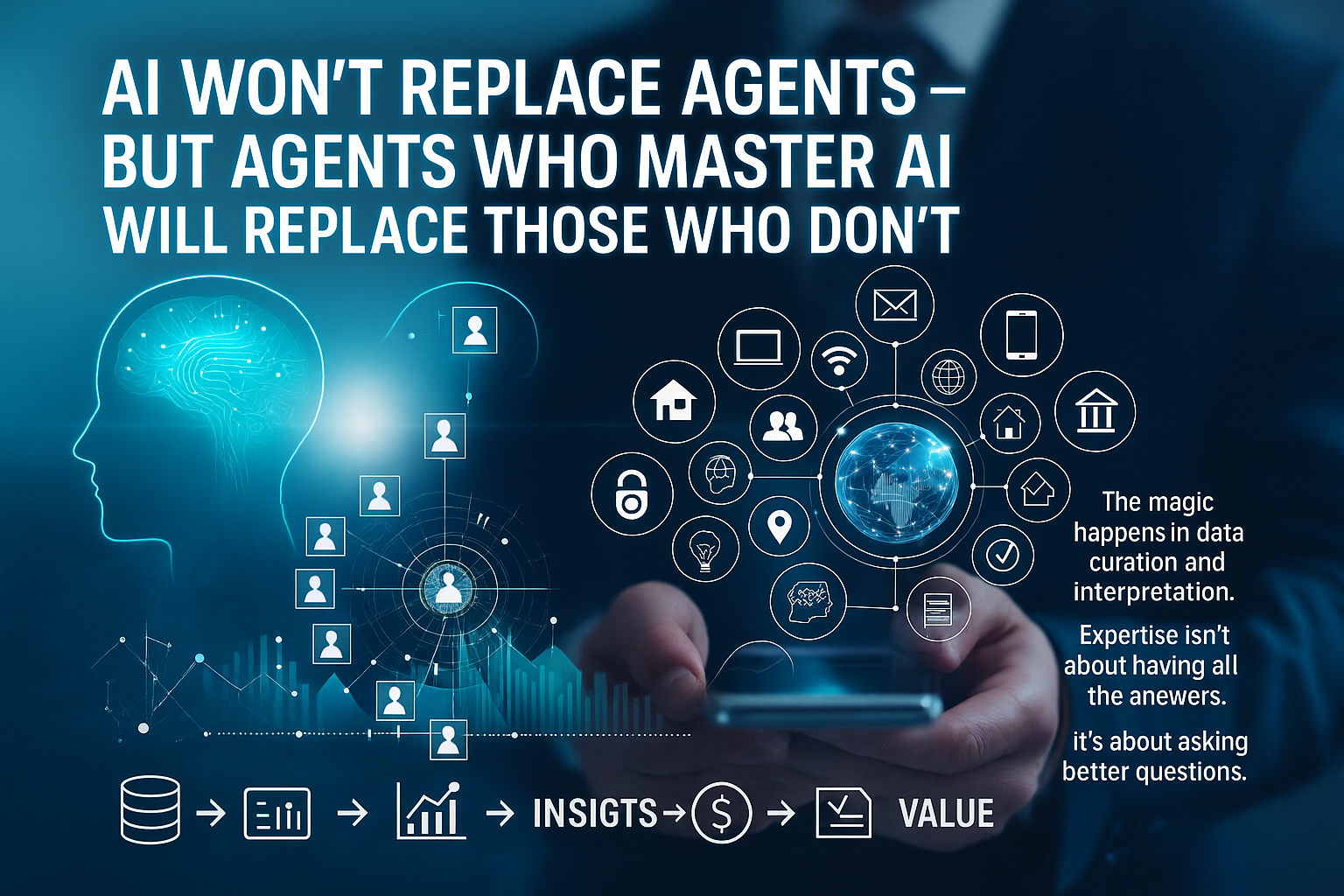
AI Won't Replace Real Estate Agents
Change used to take years. When I built my internet service provider in the 1990s, we had months to adapt to new technology.
Now change happens in hours.
I've watched three waves of technology transform entire industries. Each wave built on the last, accelerating the pace of change exponentially.
Today's AI revolution feels different. Not because the technology is smarter, but because the transformation timeline has compressed from years to literal hours.
Most real estate agents are asking the wrong question. They want to know if AI will replace them.
I'm asking how to use it better than my competition.
The Data Curation Advantage
AI doesn't create transformation. It processes information you feed it.
The magic happens in what data you choose and how you prompt the analysis. Most agents are using AI like a fancy calculator, feeding it the same MLS data everyone else uses.
I take a different approach.
Recently, I analyzed a large property in a development where smaller homes had sold for higher per-square-foot prices. Traditional wisdom says smaller homes always command premium pricing.
But I fed AI hyper-local data from just that development. Historical sales over 12 months. Specific amenities. Unique features that standard comps miss.
The AI analysis revealed pricing patterns that contradicted conventional wisdom. The larger home deserved a different valuation model based on amenities and development-specific buyer preferences.
That insight came from being an expert curator of data, not from AI being smart.
Why Human Judgment Wins
AI is only as good as the person using it. The internet contains both truth and lies. How do you teach AI to distinguish between them?
You don't. You do.
As someone who built technology companies before entering real estate, I understand both sides of this equation. Technology amplifies human capability when used correctly.
The real estate industry could see $110 to $180 billion in value creation from AI. But that value goes to professionals who understand how to curate data and interpret results.
Statistical analysis isn't my training background. But AI gives me access to statistical insights I can then interpret through my real estate expertise.
The combination creates something neither pure technology nor pure experience could achieve alone.
The Competitive Reality
Agents who refuse to adopt AI tools are making a strategic mistake. Not because AI replaces human judgment, but because it amplifies the humans who use it well.
The AI real estate market is expanding at 36.1% annually. Early adopters gain compounding advantages in accuracy, speed, and client service.
I use AI across multiple fronts. Property analysis, social media content, email newsletters, market research. Each application helps me educate buyers, sellers, and investors more effectively.
In my marketplace, I want clients to see me as the expert they trust. AI helps me deliver that expertise faster and more accurately than competitors relying solely on gut instinct.
But here's what many agents miss: AI democratizes information access, but it doesn't democratize interpretation skill.
The Authentication Problem
If everyone can produce AI-generated content and analysis, how do you maintain authenticity?
The answer lies in data differentiation and prompt sophistication.
Generic AI outputs come from generic data pools and basic prompts. When agents use the same MLS data and ask simple questions, they get commodity insights.
I add proprietary data to my AI analysis. Hyper-local trends, development-specific patterns, buyer behavior insights from my Perfect Home Finder interviews.
My prompts execute more of AI's capabilities because I understand both the technology and the real estate complexities.
The combination of unique data inputs and sophisticated prompting creates insights competitors can't replicate.
Service Before Money in the AI Era
My internal motto remains "service before money." AI strengthens this philosophy rather than threatening it.
AI helps me provide more accurate information to clients. Better market analysis. More comprehensive property research. Faster response times to questions.
Technology becomes my accountability partner, ensuring I deliver the most precise information possible for their biggest financial decisions.
Some worry about transparency. Should I tell clients when AI contributes to my analysis?
I view AI like any other professional tool. I don't announce when I use the MLS or research market articles. AI is another information source that helps me provide expert analysis.
The value clients pay for is my ability to interpret data correctly and guide them through complex decisions. AI makes that interpretation more accurate, not less human.
The Evolution Imperative
Technology has taught me one constant: adapt or become irrelevant.
Real estate agents have two choices. Use AI as a force multiplier for human expertise, or watch competitors who do gain insurmountable advantages.
The agents who thrive will be those who understand AI as an enhancement tool, not a replacement threat. They'll curate better data, ask more sophisticated questions, and interpret results through deep industry knowledge.
AI won't replace real estate agents. But real estate agents using AI will replace those who don't.
The question isn't whether to adopt AI. The question is how quickly you can become an expert curator of the insights it provides.
In Florida's dynamic market, that expertise gap is widening every day. The agents who close it first will dominate their markets for years to come.
Change happens in hours now. The time to start is today.
